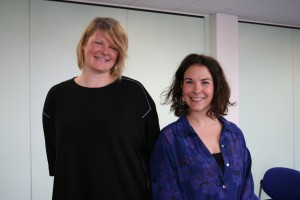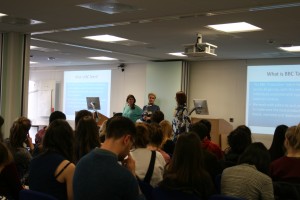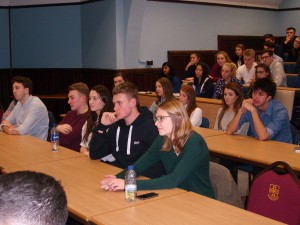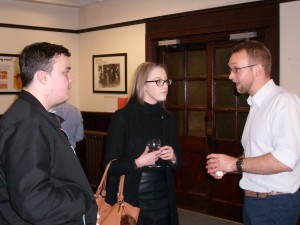Last week, more than 15 industry experts – most of whom are Bristol alumni – came in to give talks, workshops and present case studies about all things media and creative. Film, TV, radio, publishing, the art world and the importance of having great ideas were all covered – for a list of speakers and their organisations, see our in-depth summary on mycareer.

Aside from things you’d expect to hear from creative professionals (expect a varied workload, the importance of getting your foot in the door, be innovative, don’t forget ab
out small to medium enterprises and how there’s no one definitive career path), there were a number of themes which youmight not have expected. This blog post will explore those and hopefully give you the opportunity to stand out in these competitive industries.
Watch, listen, read
Not just the people, shows or books you’re interested in or would like to work for – go bigger, immerse yourself! Watch TED talks (recommended by Laura from Speed Communications, highlighting the one on Airbnb), watch shorts and first feature films (tip from Kate O’Hara, Creative England), go to art fairs (Adriana, IESA) and think carefully about audiences (Rob from BBC History magazine had students in his workshop working out who their perfect reader was).
There are no excuses!
Many of our speakers said this exact phrase, multiple times and they’re right. With the amount of free technology, apps and programmes available, there’s no reason not to make your own content, building a portfolio of your work to take to interview or when shadowing somebody. Make your

own demo (that was a top tip from Paris Troy, Heart radio), get some videos online (Will Wilkin, Lead Creative and producer for BBC radio) and practise responding to briefs (Gavin from Perfect Storm).
Be prepared
The funniest comedians and presenters have actually spent a very long time preparing their content. So, not only should you be preparing for applications, interviews and meeting industry experts, you should be developing it as a skill. Paris Troy was the guest speaker who spoke most about this and to do so, said you should make sure your organisation, time management and planning s kills are
up to scratch. Finally, a number of speakers including Will Wilkin, BBC Talent Managers Gaynor, Sas and Helen, and Julian Burrett also said be prepared to keep trying, be prepared to develop resilience and be prepared to do anything!
Tell a story
It’s not just about creating ideas – although the ability to do so helps – it’s about standing out and standing up for who you are (Paris Troy and Laura from Speed Communications). When Will Wilkin was talking about the need to tell a story, especially in applications, he said that you should literally tell a story (see his LinkedIn profile for a

n example) and that everyday life is suitable content. Other tips included create an emotional connection (Gavin from Perfect Storm, Laura from Speed Communications) and don’t be generic (Paris). Alongside this, Julian Burrett said it’s good to be open to creativity from others too.
Specialisms
On one hand, you should be an expert in what you do (Julian Burrett) but on the other hand, you need to be versatile (Will Wilkin). You might be generating ideas for multiple platforms (a magazine with an accompanying app, writing cricket news but cutting film about a match too) but you might also be working in a specialist area within the sector. For example, Laura talked about how Speed cover three main divisions: business and corporate, sports and wellbeing, consumer and lifestyle. Similarly, Adriana from the IESA described how the art world, sitting within the creative industries, has sub-sectors which include the dealers, contemporary art, art fairs, insurance and law, investment and client services.
Want more?

This is just an overview of the key themes but if you want more, check out our in-depth summary on mycareer. There’s a list of speakers on there too, as well as lots of information about the different areas of the media industry and creative sector.

 The Careers Service talk to around 80% of graduates each year to find out what they are doing six months after graduation as part of the
The Careers Service talk to around 80% of graduates each year to find out what they are doing six months after graduation as part of the  The Careers Service is here to help you explore the range of options available to you – use our online resources to
The Careers Service is here to help you explore the range of options available to you – use our online resources to 

